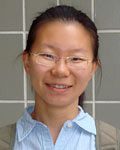Ph.D. in Education, 2013
School of Education
June 1, 2009
“Wide view and wise use, profound accumulation and prudent delivery,” Su Shi
I am a first-year doctoral student in the Educational Policy and Social Context (EPSC) specialization. My interdisciplinary research locates in the fields of economics, education and psychology.
My interest in these fields emerged from personal experience. Six years ago, I was a volunteer teacher in China in an elementary school for economically disadvantaged children. My observations of the aberrant psychological status of the children motivated my initial research and led to my first policy paper: “Psychological Problems of Poor Children in Beijing.” One of my recommendations in the paper was for one-to-one cooperation between scholars and school superintendents in the fields of social services and teacher professional development.
As my research interests went deeper and broader, I began to study education as a kind of “investment” and was attracted to the works of Denison, Schultz, Becker, and Mincer. My second paper, “Walking with Two Legs,” borrowed from Denison to measure returns of two groups of children, one from low income families and one from high income families. The results showed that given the trend of 20 years, between 1984 and 2003, children from low-income families would contribute more to economic development than those from high-income families if educational resources were allocated equally between them.
From my research and my experiences as an elementary school volunteer, a middle school teacher, and a part-time university lecturer, I realized that it is essential to build connections between school, family, and community and to solve problems of educational inequality in a whole social environment, and I sought additional education.
In 2006, I entered Harvard Graduate School of Education. With my bachelor’s degree in Economical Information Management from the Central University of Finance and Economics in Beijing, I looked forward to learning more about the economics of education during my Master’s work. At Harvard I particularly enjoyed a course entitled Time Series Analysis, which provided training in advanced econometric methodologies. My final project for this course used panel cointegration estimation to analyze how educational expenditures in school matter for different racial groups of students.
Following completion of my master’s degree, I took a position as a research associate in Harvard Business School and worked in the area of international energy competition. Exposure to perspectives of local and national government taught me to view education as a part of government expenditure. I was introduced to the equilibrium model, which explains and explores behaviors of supply, demand, and prices in a whole economy and is able to combine factors such as school quality, segregation, housing prices, and property taxation. The equilibrium model presented exciting possibilities for a new direction of research into the economics of education.
Currently, I am a Graduate Student Researcher (GSR) in the Department of Education, working with a meta-analytic database in the National Forum on Early Childhood Program Evaluation. Being a coder for a meta-analytic database, I am gaining valuable experience by delving deep into papers to analyze almost every detailed facet.
In addition to my GSR position I am working with Professors Farkas, Duncan, Vandell, and Burchinal on the impact of preschool experiences varying by the skills children exhibit when they begin preschool. In this project, I am using a NICHD-SECC dataset and propensity score matching technique. The project is expected to result in a curvilinear relationship between early skills and preschool impacts, with weaker preschool benefits for students whose skills are so low that they are unable to profit from high-quality instruction, and null-to-weak benefits as well for students whose skills are above average and less in need of such instructional assistance to maintain age-appropriate growth in school readiness.
I am enjoying my doctoral work, and I am guided by my favorite quotation: “Wide view and wise use, profound accumulation and prudent delivery,” from Su Shi, a great scholar in Ancient China.
